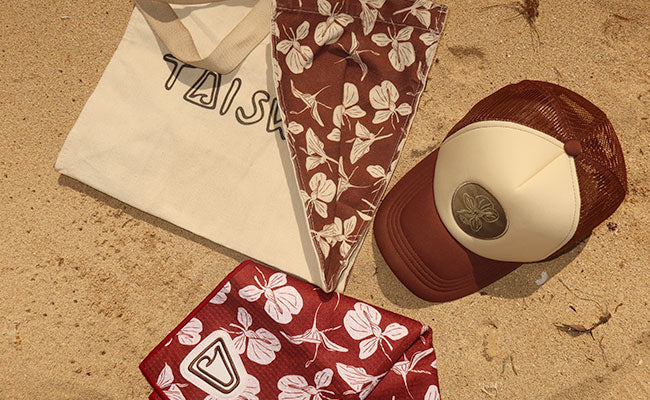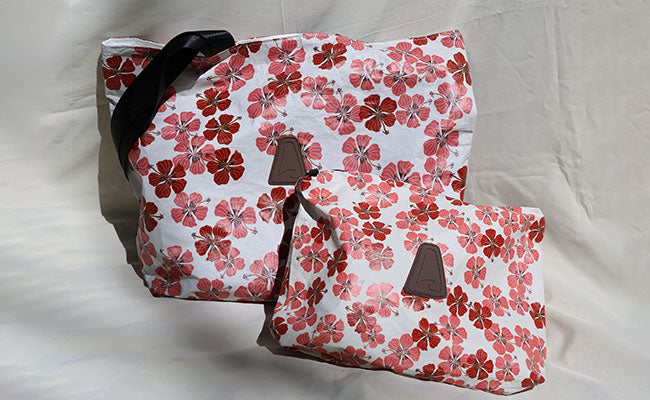
USA vs. China vs. Indonesia: Where should you manufacture your products?
In the world of fashion, where you produce your clothing can be a controversial topic. There's often a stigma associated with certain countries and their manufacturing practices, and China, unfortunately, bears the brunt of this misconception. As the founder of a small swimwear brand, I've faced my fair share of these unfounded biases, which need some serious debunking.
Before we start, consider this:
It's essential to make a clear distinction between a small batch bikini factory and the large-scale manufacturing plants often associated with global tech giants like Apple. Small-scale, sustainable swimwear production is vastly different from the massive operations that churn out electronic gadgets on a colossal scale. The labor conditions, environmental impact, and overall work environment in these two sectors couldn't be more contrasting. So, when it comes to judging the ethics and sustainability of a brand's manufacturing location, it's crucial to look beyond stereotypes and consider the specific circumstances.
The Unfounded China Stigma:
It's disheartening to see how quickly some people write off any product made in China as inferior. Sure, there are fast fashion giants like SHEIN with questionable ethical practices, but they don't represent the entire manufacturing industry in China. To be frank, it's incredibly ignorant to assume that every manufacturer in a country of over a billion people shares the same practices. I could go on about China's rich history and evolving labor regulations, but I'd rather debunk this myth with a personal story.
My Experience: Racism and Retail
I once had a retailer reject my swimwear solely because some of it was made in China. In a shocking display of ignorance, they assumed that a product's quality and ethics were solely determined by its country of origin. It's a stark reminder of how pervasive these misconceptions are and how important it is to challenge them.
She texted me "No China in my stores".
I almost had to laugh. The very phone she just used to text me racist comments was manufactured in the place she claimed to never support. It was so backwards, but also eye opening.
In the diverse melting pot that is Hawaii, where cultures blend harmoniously, it's vital to acknowledge the significant Chinese population living here. It's a reminder of how diverse and multicultural the world is, and it can help us challenge stereotypes and misconceptions about China. In this unique and diverse environment, we understand the importance of respecting and appreciating the different cultural backgrounds that make up our vibrant community. We should not let stereotypes taint our perceptions of places and people we may not fully understand. Instead, let's strive for open-mindedness, acceptance, and respect for each other, no matter where we come from or where we're creating our products. Hawaii's cultural tapestry teaches us that there's always more than meets the eye, and it's worth getting to know each other beyond surface-level judgments.
The Hypocrisy in "Where It's Made" Questions:
It's amusing how some people are quick to ask about where a product is made, all while they're busy typing on their iPhones (made in China), lounging on their Target furniture (also made in China), and ordering boxes from Amazon every day (you guessed it, all from China). The irony is undeniable. We seem to pick and choose what's acceptable to buy from China, often overlooking the origin of our daily essentials.
The Bali & USA Paradox:
On the flip side, there's a paradoxical admiration for brands manufacturing in Bali. While it's a beautiful place with a rich culture, not every Bali-made brand is ethical and eco-friendly. Tai Swim Co is proud to manufacture in Bali, but it took a very long time to find a facility that was up to our standards. With little to no regulation, there are hidden sweatshops, and many aren't as tightly regulated as you'd think. It's not where you make your product; it's how you make it that matters. My close friend who also manufactures in Bali shared some sentiments with me when she visited in Fabruary 2024. She shared with me that in the winter, entire beaches are covered in plastic. Is the beached cleaned up? No. Pounds and pounds of plastic are merely swept up into mountains for tourists to avoid during the day -- just to be washed away at night again & the process repeated.
The Reality of Manufacturing in China:
The truth is, China is home to some of the world's strictest regulations on manufacturing. With a strong emphasis on quality and ethical practices, they've come a long way. Workers in China enjoy reasonable working hours, with almost all factories in the country taking month-long vacations during Chinese New Year. Lunch breaks are in well-lit rooms with air conditioning, and they don't work on weekends. They work a regular 9-5, just like us.
So you might be reading all this thinking we're not telling the whole side of the story when approaching how to talk about a country without acknowledging their history & recent issues. Let's unpack those now:
There are various reasons why some individuals might have negative opinions or concerns about China. Remember that these opinions are diverse and may not apply to everyone:
-
Human Rights Concerns: China has faced criticism for its human rights record, including issues related to freedom of speech, press, and assembly. Concerns about the treatment of minority groups, such as Uighurs, have garnered significant attention.
-
Political System: China's one-party political system, led by the Chinese Communist Party, can be a point of contention for those who value multiparty democracies.
-
Censorship: The Great Firewall of China is a system of strict internet censorship and monitoring. This can be seen as limiting freedom of information and expression.
-
Trade Practices: Some people argue that China engages in unfair trade practices, including intellectual property theft and the undervaluing of its currency.
-
Environmental Concerns: China is a major global polluter. Its rapid industrialization has led to environmental issues like pollution and deforestation. Some criticize its environmental policies.
-
Animal Welfare: The treatment of animals, particularly in the wildlife trade and certain farming practices, has raised concerns.
-
COVID-19 Origin Controversy: The initial handling of the COVID-19 pandemic and ongoing debates about the virus's origin have added to negative perceptions.
-
Nationalism: China's assertive foreign policy, territorial disputes in the South China Sea, and its approach to Taiwan can create tensions and nationalist sentiments.
-
Lack of Transparency: Critics argue that China's government lacks transparency, particularly in terms of data and information sharing, leading to a lack of trust in official statements.
While there are issues and controversies, China is a vast and diverse country, and generalizations should be avoided. Public opinion can vary widely, and not everyone shares these concerns or sees China in the same light.
Let's not forget that China is the birthplace of countless inventions, with a very complicated history, just like any place. Some apprehension from patriotic Americans towards China may be rooted in jealousy, as they have risen to become a global manufacturing powerhouse. In Hawai'i in particular, there's a unique perspective on patriotism. Our history, marked by the illegal overthrow of Queen Lili'uokalani and the annexation of our islands, has led to a distinct sense of identity and independence. Many Native Hawaiians & generations of locals don't share the same patriotic fervor for the United States as those in the continental part of the states.
It's also worth mentioning that Hawai'i, often described as a cultural melting pot, embraces a sense of openness and tolerance. The diverse makeup of our islands has fostered an environment of acceptance and appreciation for different cultures. People from Hawai'i tend to be more open-minded and less prone to the racial biases and prejudices that persist in some other parts of the United States.
While Hawai'i certainly embraces a diverse and open-minded culture, like any place, it's not without its own complexities. Our islands can often feel like one big small town, where everyone seems to know everyone else. However, it's essential to remember that this unique dynamic, while fostering tolerance and acceptance, can also give rise to its own set of issues. Not everyone who comes to our islands necessarily understands or respects the local culture. As mentioned earlier in this blog post, sometimes individuals, even business owners who say "No China in my stores", may bring their own biases to a place where they are not from, and frankly where they don't belong.
And just like China, the United States and Indonesia, both diverse countries, have their share of criticisms and controversies:
United States:
-
Gun Violence: The United States faces ongoing concerns about gun violence, leading to calls for stricter gun control measures.
-
Racial Tensions: Racial inequality and tensions persist, particularly in law enforcement interactions and access to opportunities.
-
Income Inequality: Wealth and income disparities are substantial in the U.S., leading to concerns about social and economic justice.
-
Healthcare Costs: The high cost of healthcare and issues around healthcare accessibility are subjects of national debate.
-
Environmental Impact: Despite being a major global emitter of greenhouse gases, the U.S. has been just as criticized as other countries for its environmental policies.
-
Political Polarization: The U.S. faces significant political polarization, affecting legislative efficiency and public discourse.
Indonesia:
-
Deforestation: Indonesia faces challenges related to deforestation, often linked to the palm oil industry, which has led to concerns about the environment and wildlife.
-
Corruption: Corruption has been a historical problem in Indonesia, affecting public services and governance.
-
Religious Tensions: Indonesia is a multi-religious nation, and tensions between religious communities, particularly between Muslims and non-Muslims, have been noted.
-
Environmental Issues: Indonesia grapples with issues such as air pollution, water pollution, and waste management.
-
Freedom of Expression: Some argue that freedom of speech is limited in Indonesia due to strict blasphemy laws.
-
Economic Inequality: Like many countries, economic inequality remains a concern in Indonesia.
It's important to recognize that the United States, China and Indonesia are complex nations with diverse populations. While there are issues and controversies, there are also positive aspects, such as cultural diversity, innovation, and community efforts to address these challenges. Public opinion on these issues can differ widely, and not all individuals share the same concerns about their own countries.
My Journey in Search of Sustainable Manufacturing:
Tai Swim originally started as a proudly Hawai'i-made brand. However, when I embarked on the quest to find local manufacturers, I was met with a harsh reality. The manufacturing options in Hawai'i were far from the idyllic, eco-conscious spaces I'd imagined. Instead, I found mold-covered walls, outdated and broken appliances, and unsustainable AC systems that ran incessantly. Leaky faucets wasted precious water and the conditions were embarassing.
It was an awakening experience, and one that was echoed in my visit to New York. There, I was shocked to discover antiquated punch-in, punch-out cards mounted on walls, and even the sight of a rat darting across my foot in the facility I visited in the Garment District. They had posters on the walls noting that their fabric stacked to the ceiling wasn't up to fire code. It was a hot mess, and an undeniable hazard. The sewing teams were people in their late 60s. The notion that American-made equates to higher standards quickly unraveled, revealing that eco-friendly, sustainable manufacturing practices can be found in surprising places.
This insight led me to redefine the priorities for my swimwear brand and strive for ethical, sustainable practices, regardless of the geographical location of our manufacturing partners.
The Takeaway: Do Your Research
-
Challenging Stigmas: The Origin of Our Products
If you think that a retail tag that says "China" means child labor or unfair working conditions, I'm here to tell you that you are wrong. Until you actually go there & see it with your own eyes, I'm sorry but you aren't qualified to have an opinion. The stigmas around product origin can often be misleading. Let's dig deeper to challenge these preconceptions.
-
The Human Aspect: Ethical Manufacturing
China and Bali, like anywhere else in the world, have their share of factories with questionable labor conditions. However, it's unfair to generalize. In both locations, some factories uphold high ethical standards, with workers being paid fair wages and ensuring their rights are respected. Ethical manufacturing is about putting people first, no matter where it happens.
-
Transparency and Certification: The Marks of Integrity
Transparent supply chains are the bedrock of ethical fashion. Brands should willingly share where and how their products are made. Furthermore, certifications like OEKO-TEX, Fair Trade, and others reflect a commitment to ethical and sustainable practices. When supporting a brand, it's crucial to choose one that values transparency. Tai Swim is proud to work with manufacturers who carry these certifications.
-
Environmental Impact: A Closer Look
Manufacturing, whether in Guangzhou or Bali, has environmental implications. Let's appreciate the efforts taken in China to improve sustainability and waste reduction, because they far outweigh those happening in their neighbor country across the sea. Sometimes, the focus on ethical manufacturing might lead to more eco-conscious practices in unexpected places. It's vital to consider the ecological footprint of your purchase.
-
Consumer Responsibility: Making Informed Choices
Your choices matter. As a consumer, you have the power to influence the industry's direction. By researching brands and being conscious of their practices, you can promote ethical fashion. Your decisions can drive change.
-
The Role of Fast Fashion: Influencing Perceptions
The fast fashion industry, driven by relentless consumer demand, has played a significant role in tarnishing the image of countries like China. However, let's not forget that even in places that seem more appealing, such as Bali, there can be unscrupulous manufacturers who sacrifice ethics for profit. It's time to question where we draw the line.
-
Personal Stories: A Journey of Discovery
Understanding the reality behind these stigmas isn't a simple task. My journey of discovery involved witnessing decrepit factories in New York and experiencing some of the highest standards in China. I've seen how brand tags are not a reliable measure of ethics. We must move past stereotypes and dive into the real stories.
My factories aren't just faceless production centers; they're an integral part of the Tai Swim family.
In an age where brands can easily disconnect from the people behind their products, I've chosen a different path. I've worked side by side with my factories, sewing bikinis, attaching tags, and crafting each piece with care. They're not just business partners; they're friends and family. We've shared meals, stories, and even homes. I talk to them more than I talk to my siblings or my parents. It's a level of trust and collaboration that's hard to find in this industry. Our bond goes beyond business; it's personal, and it's what makes Tai Swim more than just a brand; it's a close-knit community of people who genuinely care about the products we create.
Consumer Responsibility: A Matter of Choice
We might own an iPhone made in China, sitting on a chair crafted in the same country, while ordering countless products from Amazon — all without questioning the origins. Let's acknowledge that conscious consumer choices have a profound impact, and the same applies to the swimwear you choose to wear.
When it comes to choosing brands to support, your focus should be on transparency and ethical practices. Research where and how a product is made. Don't let misguided perceptions influence your choices. It's time we moved beyond unfounded biases and started giving brands the credit they deserve for their commitment to quality and sustainability.
Remember, it's not where a product is made; it's how it's made that counts. Let's appreciate and support the brands that uphold high standards, regardless of their manufacturing location.
This blog post was co-authored by individuals who are native to or have lived and worked in Hawai'i, China and Bali. With firsthand experience and in-depth knowledge of the labor conditions in these regions, they provide valuable insights and a nuanced perspective on the matter. Their personal accounts shed light on the reality of manufacturing in different parts of the world, dispelling myths and promoting a more informed understanding of global production practices.










Leave a comment
This site is protected by hCaptcha and the hCaptcha Privacy Policy and Terms of Service apply.